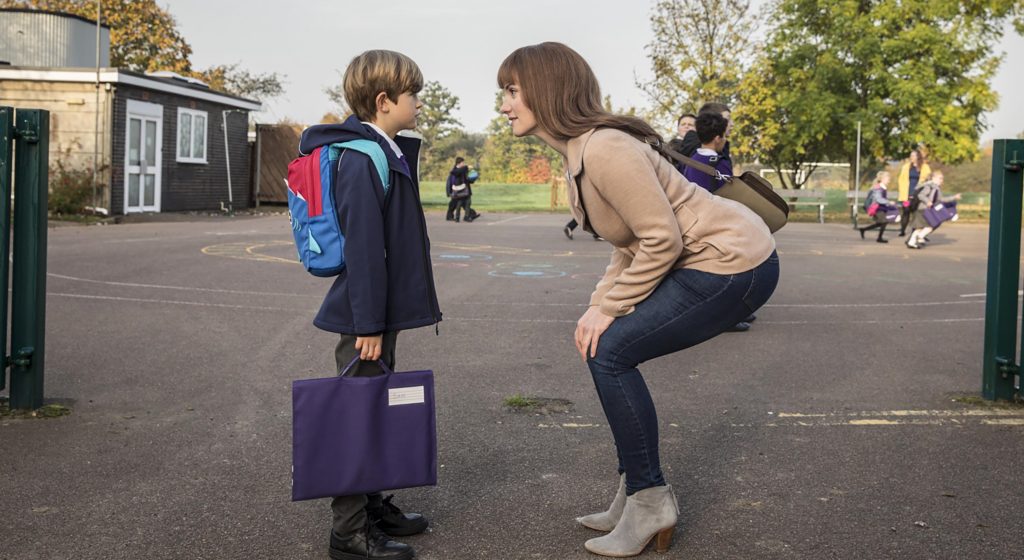AMC’s “Humans” is, on the surface, a television show about artificial intelligence, and its place within a society that is much like ours. Set mostly in the UK, in a parallel present, the show’s third season will premiere in the U.S. today, June 5. While the world it’s set in certainly features plenty of robot entities — known as synths — the story is grounded in the domestic, concerning itself far more with the relationships between characters than showing off the usual technological markers of science fiction. Quite refreshingly, the series is driven by its female characters, though never in a way that makes it seem like it’s posturing for praise.
Through characters such as humans Laura Hawkins, her daughters Mattie and Sophie, Astrid Schaeffer, and Dr. Athena Morrow, and conscious synths — androids that can think for themselves, and feel — Mia, Niska, and Karen, the show explores themes of family, identity, purpose, disillusionment, and inadequacy, consent, social acceptance, and social division, nature vs. nurture, and motherhood. It’s this last topic in particular that is consistently used as a poignant through-line, and is poised to remain relevant in the show’s third season.
“Do you think we love our children because we choose to? Or because we have to?”
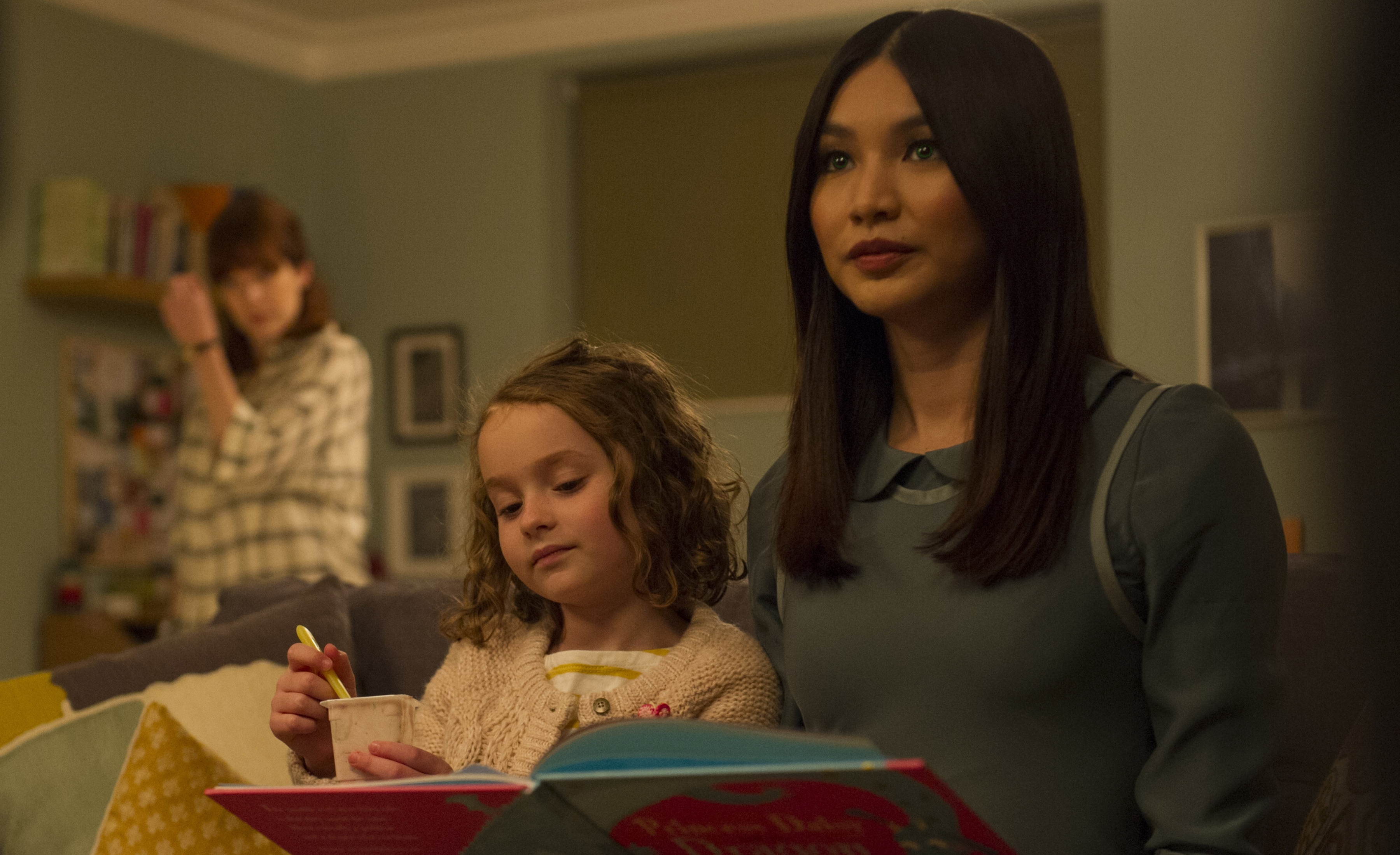
A wary Laura watches her youngest daughter, Sophie, with “Anita”: Des Willie/Kudos/AMC/C4
The show first reveals its preoccupations with motherhood very early on, through the meeting of its two most central characters. When Laura (Katherine Parkinson)’s husband purchases a domestic synth unit, Anita (Gemma Chan), against her wishes, she is instantly apprehensive towards and suspicious of the quiet, dutiful addition to the household. But rather than delving into a story about whether or not such technology can be trusted, series creators and head writers Sam Vincent and Jonathan Brackley use Laura’s animosity to expose her motherhood anxieties.
Midway through Season 1, Laura eventually opens up to her teenage daughter Mattie (Lucy Carless) about her own childhood, and the tragic accidental death of her younger brother while he was in her care, an incident Laura’s mother subsequently blamed her for. The admission immediately throws her episodes-long preoccupation into a new, incredibly sympathetic light. Previously, when Anita had innocuously said, “I will always keep Sophie safe,” Laura heard it as an accusation, a personal attack on her own ability to do so. “It seemed like what you really meant was I wouldn’t,” she tells the placid Anita.
Furthermore, what really gives these interactions between human and synth added depth, beyond Parkinson and Chan’s excellent performances, is the audience’s knowledge that while Anita presents as a simple, programmed synthetic, deep beneath her coding is Mia, a thinking, feeling being who was captured, and who is constantly fighting against the code forcefully installed in her. While Mia was originally intended as a sibling for her creator’s son, Leo Elster (Colin Morgan), she ultimately took on a more maternal role towards the boy as he grew up. It’s her latent desire to return to her now-adult son’s side that causes her to treat both Sophie (Pixie Davies) and Laura with sympathy on the rare occasions her own personality rises above the Anita programming. When an upset Sophie demands a cuddle from Anita after a nightmare, Mia fights against the blocks that should prohibit such behavior from a domestic synth — they cannot touch young children without parental permission — and wraps her arms around the child to reassure her, in what is an understated but hugely affecting moment.
On another occasion when she briefly regains consciousness, Mia’s sudden transformation from passive and observant to gasping and aware alarms Laura and Mattie. Having just been present for Laura’s emotional unburdening to Mattie, Mia appeals to the women by drawing on everything she has observed and intuited — something a non-conscious synth would never be able to do. “You fear deep down that you’re like her,” she says softly, referring to the mother who had withdrawn emotionally, and wished Laura dead. “But you’re not, Laura.” As such, Mia’s grasp of the emotional complexity of Laura’s interiority — facilitated by Mia’s ability to empathize, and by her own maternal concerns — inspires Laura to recognize Mia’s personhood beyond her synthetic chassis.
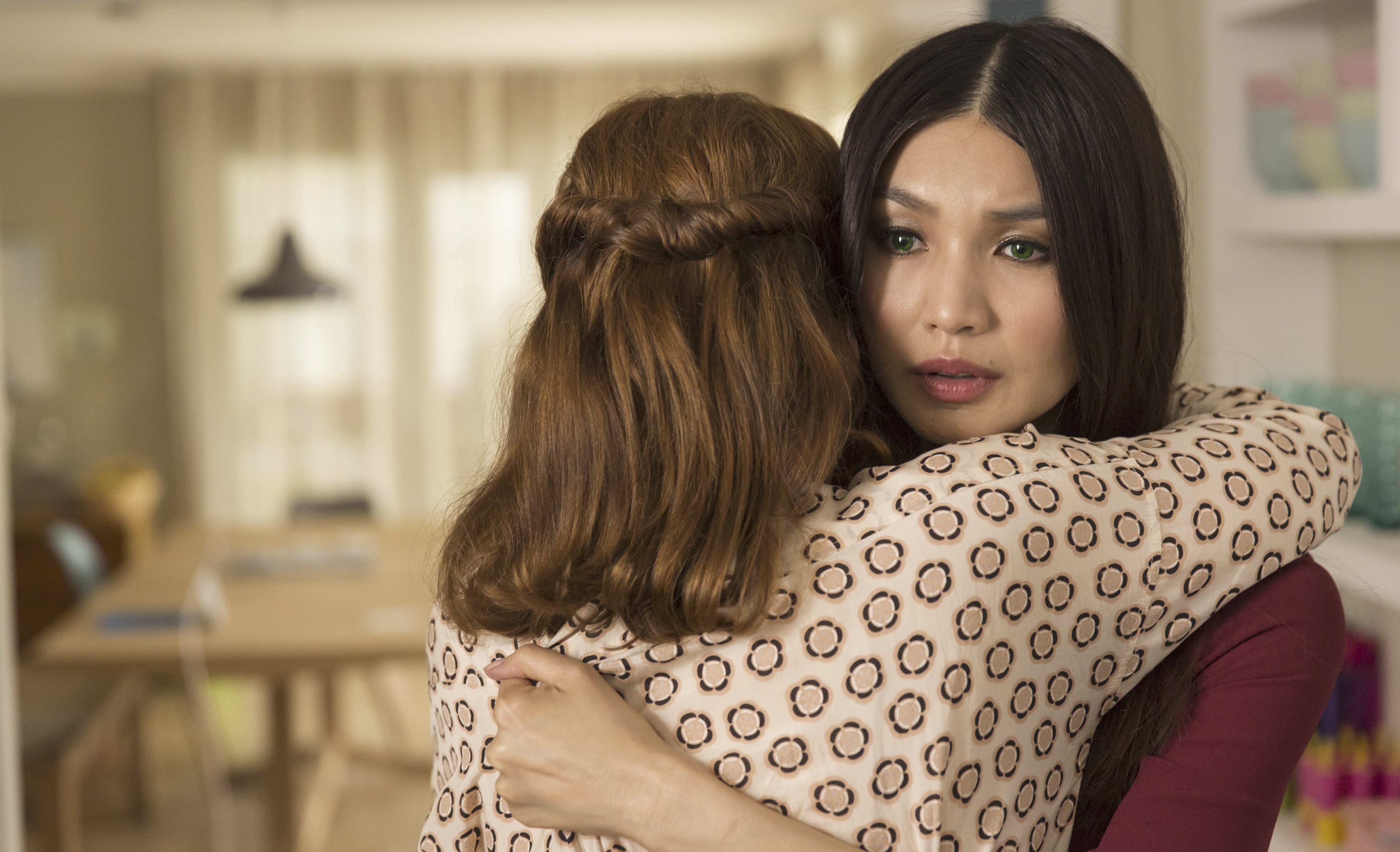
Laura and Mia are reunited in Season 2: Colin Hutton/Kudos/CH4/AMC
Despite being the family members most uncomfortable about the purchase of “Anita,” Laura and Mattie are also the most curious about her eccentricities, a curiosity that soon develops into a genuine concern for the synth, and her cause. Eventually, Laura and Mia — the matriarchs of their respective families — forge a relationship of mutual respect, and care for the other. When Laura becomes embroiled in the conscious synths’ fight for their right to exist, and subsequently reduces her involvement in her own family’s home, though she feels guilt, she is never made to feel like less of a mother, and her efforts to support Niska (Emily Berrington), Mia, and the synth cause are ultimately lauded, rather than criticized.
“He didn’t want me. He wants Beatrice. I’m not her.”

Karen and Billy: Colin Hutton/Kudos/CH4/AMC
However, it’s not just through Laura and Mia that the writers explore motherhood. Throughout the series, many of the narrative’s biggest developments are shaped by the actions of a mother or mother-figure. It transpires that young Leo Elster’s mother, Beatrice, drove herself and Leo into a lake, killing them both — though in the boy’s case, the death was only temporary. In an ill-conceived attempt to replace his revived son’s mother, Leo’s father built a conscious synth replica of Beatrice, but she was instantly rejected by the boy in the wake of his trauma.
Separated from the synth family she never got to know, “Beatrice” was forced to make her own way in the world of the humans, and adopted a dead woman’s identity to become Karen (Ruth Bradley). Her struggle to reconcile the purpose she was created for, with her inability to fulfill that purpose, is one of the show’s more fascinating character studies.
Karen spends much of Seasons 1 and 2 searching for a new purpose, and exists between identities, with no grasp of who she really is. In Season 2, she discovers a prototype child synth, Sam (Billy Jenkins), and begins to bond with him. However, when tragedy strikes, she loses the will to go on existing, and asks Sam to assist her in driving their car into the river; her programming pointedly prevents her from endangering her own life. Yet at the very moment the car is accelerating into the water, Sam suddenly gains consciousness — a result of Mattie and Niska’s actions, which have world-changing consequences — and gasps in fright, and Karen makes a split-second decision to halt the car, and save the conscious child now in her care.
It’s a poetic parallel to the original Beatrice’s actions, with Karen acting in opposition to how the very woman she was modeled on did in the situation with Leo. By choosing in that moment to live, and save the child, she fulfilled her quite literal purpose as a mother-figure who would allow no harm to come to her (adoptive) son, setting her on a path to be a mother without rejection. Theirs is a humorously quirky, unconventional, yet touching relationship that has already seen new, life-altering development in the third season, which began airing in mid-May in the UK.
“We can’t know if a child wants to be born, who it will be, or what kind of life it will have.”
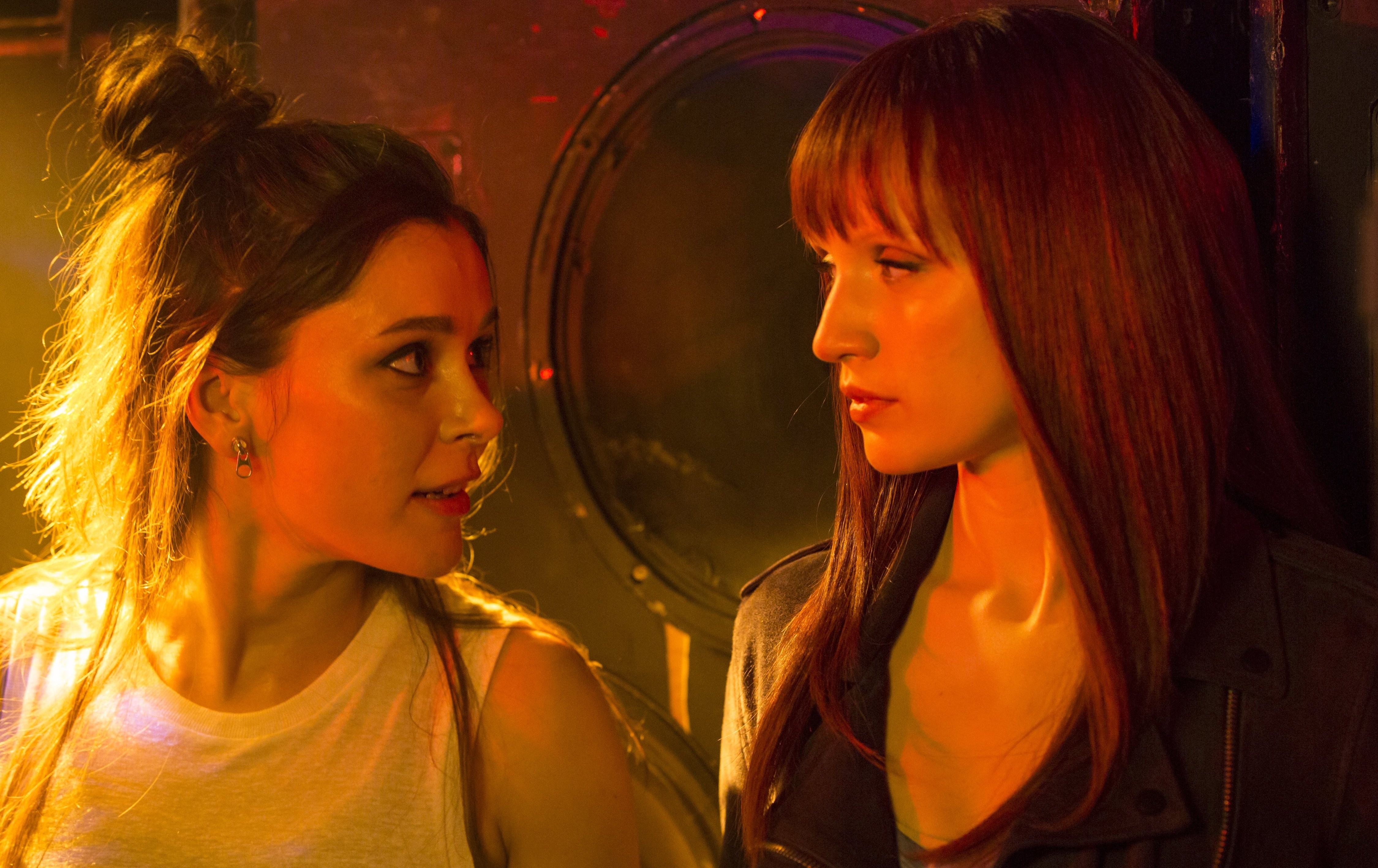
Astrid and Niska: Colin Hutton/Kudos/CH4/AMC
Elsewhere, the conscious synth Niska is used to explore the concept of species proliferation. In the first season, Leo discovered his father’s code to create synthetic consciousness, and the season ended with Laura being entrusted with its safekeeping, while Niska secretly made her own copy. Following harm and trauma inflicted by humans, Niska exhibits a hard, angry exterior, is generally distrusting of humans and their intentions, and she frequently strikes off on her own quest — but she never loses her capacity to grow or care for others.
When Season 2 begins, though determined to see a world filled with others like her, Niska is initially worried that society is not ready for conscious synths to become commonplace. She meets a human woman, Astrid (Bella Dayne), whom she embarks on a romantic relationship with, and it is (childless) gentle Astrid’s carefree attitude to parenting — “you just show them [children] the way” — that inspires Niska to upload the code to all synths around the world. Determined that these synths will be birthed into a safe society, she enlists Laura’s help to prepare the groundwork for their legal protections, to “show others the way.”
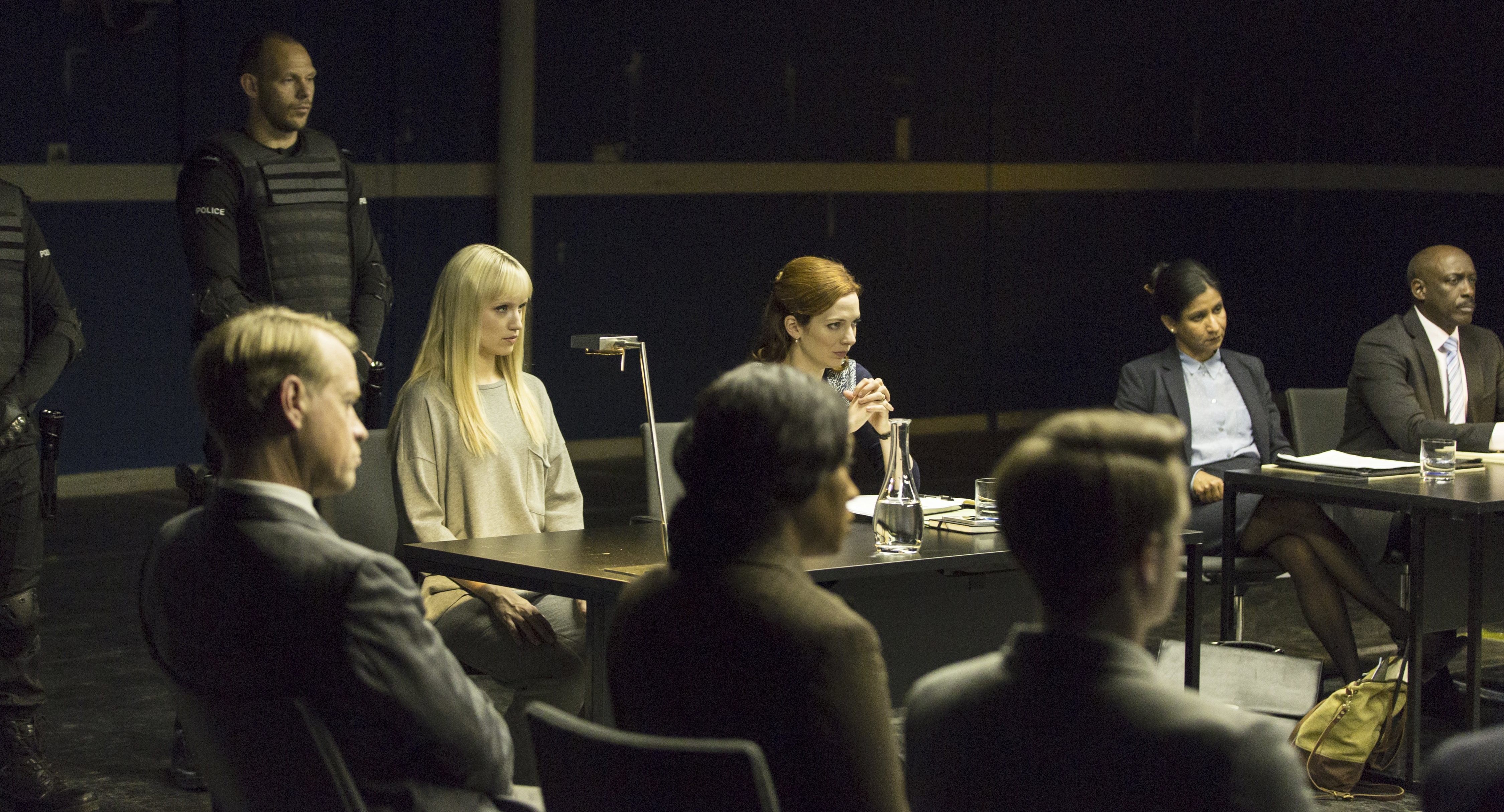
Laura (center) fights for legal protection for Niska (left): Colin Hutton/Kudos/CH4/AMC
Though the code does not immediately affect many synths, Mattie perfects it, and at season’s end, she is faced with the dilemma of programming consciousness into all synths worldwide in an instant, or letting Mia die permanently. At Niska’s urging, Mattie chooses the former, and just like that, the two — synth and human — are responsible for the mass birth of a new species, in a world that is totally unprepared for it. As with Karen’s decision to save Sam, it’s a responsibility that is set to bear huge weight on Mattie in the third season.
“If a thing can be free, it should be free. If it can think, it should think. If it can feel, it should feel.”
These are not the only representations of motherhood in the show — also notable is Carrie-Anne Moss’ tragic role as an AI expert searching for a way to upload her comatose daughter’s consciousness to a new body — and quite possibly will not be the last. Of course, there is a fine line to be trod when it comes to representing motherhood in female characters’ narratives, and particularly in mainstream science fiction — so much of which is shaped by men — narrow visions of motherhood, reproduction, and womankind plague the female characters caught up in these representations. It’s hugely important that those characters not be solely defined by the trait of motherhood, or devoid of agency. Fortunately in “Humans,” that is far from the case.
Interestingly, the show returns for its third season with a much increased female presence behind-the-scenes, on set, and in both producing, and writing roles, which is encouraging given the latest statistics about women screenwriters to come out of the UK. As such, it’s exciting to see what influence they bear on the further exploration of themes through the female characters, both human and synthetic, and particularly how they continue to develop or subvert the theme of motherhood through the series.
“Humans” third season premieres June 5 on AMC.
